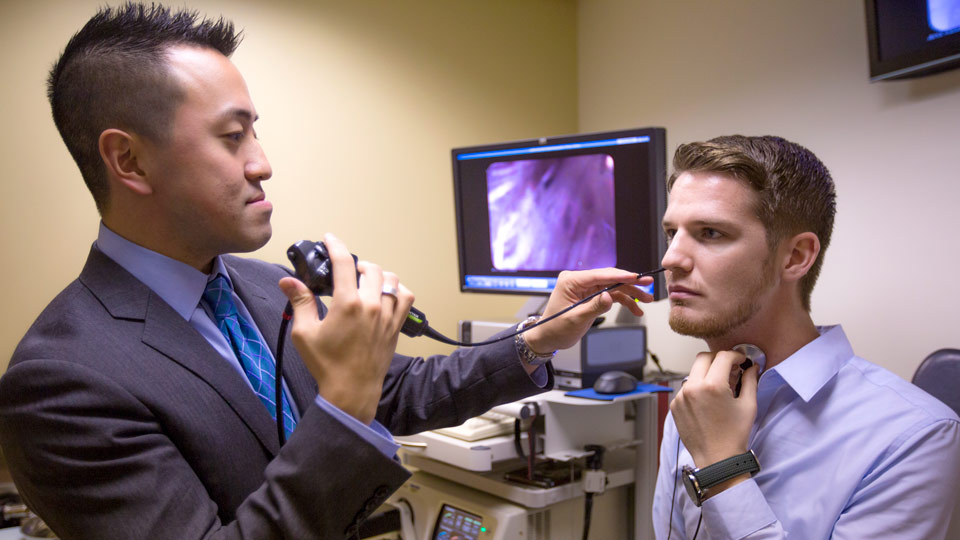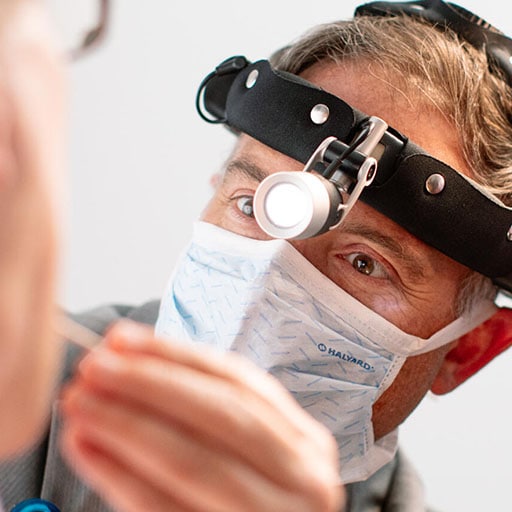7 Powerful Reasons to Visit an ENT Clinic for Ongoing Allergy Symptoms
7 Powerful Reasons to Visit an ENT Clinic for Ongoing Allergy Symptoms
Blog Article
Discovering the Area of Otolaryngology: What to Anticipate When You Consult an ENT
Otolaryngology, generally described as ENT, includes the diagnosis and treatment of ear, throat, and nose disorders. For those experiencing related problems, getting in touch with an ENT expert can supply quality and relief. Understanding what to anticipate during such appointments is crucial for reliable communication and treatment. This review will describe key elements of the ENT experience, consisting of typical factors for brows through and the processes associated with diagnosis and therapy.

Understanding Otolaryngology: An Introduction
Otolaryngology, usually referred to as ENT (Ear, Nose, and Throat) medication, is a customized branch of medication that focuses on the medical diagnosis and treatment of conditions impacting these essential areas of the body. This area encompasses a broad array of conditions, including those pertaining to hearing, balance, respiratory function, and speech. Otolaryngologists are educated to handle both clinical and medical therapies, utilizing advanced strategies and modern technologies. Their competence extends beyond traditional disorders, addressing issues such as allergic reactions, sinus infections, and hearing loss. Additionally, they play a crucial role in the management of head and neck cancers cells, offering complete care customized to specific person needs. Generally, otolaryngology continues to be important for keeping health and lifestyle in damaged people.
Common Reasons to See an ENT Specialist
Many individuals seek the competence of an ENT specialist for a selection of reasons, reflecting the diverse nature of problems that affect the nose, throat, and ear. Common problems include persistent sinus problems, which frequently brings about persistent nasal congestion and facial discomfort. Allergies and their linked signs and symptoms, such as itching and sneezing, additionally trigger visits to these specialists (Hearing). Hearing loss, whether sudden or steady, is an additional substantial factor for consultation. Additionally, people might seek evaluation for throat conditions, including persistent hoarseness or ingesting troubles. Sleep apnea, characterized by interrupted breathing throughout sleep, is frequently resolved by ENT specialists as well. Each of these problems highlights the value of specialized care in taking care of complicated ENT-related wellness issues
Planning for Your ENT Appointment
When preparing for an ENT appointment, it is vital to collect appropriate info and consider any type of certain problems. Individuals must assemble an in-depth medical history, consisting of previous ear, nose, or throat problems, surgical procedures, and existing drugs. Recording signs-- such as seriousness, period, and regularity-- can supply useful understandings for the ENT specialist. In addition, people should prepare a list of concerns they want to ask, guaranteeing that all worries are addressed throughout the see. Bringing along any type of relevant medical documents or test outcomes can better aid the ENT in understanding the client's condition. Individuals should confirm their appointment details, including area, date, and time, to minimize any type of last-minute confusion. Proper prep work can enhance the performance of the consultation and bring about better results.
What to Anticipate Throughout the Appointment
As the consultation starts, the client can expect to participate in a comprehensive conversation with the ENT specialist about their signs and symptoms and clinical history. The specialist will certainly inquire regarding the duration, frequency, and extent of signs such as hearing loss, nasal blockage, or aching throat. Furthermore, the patient's previous medical problems, medications, and any relevant household history will be reviewed, assisting the expert in forming a complete understanding of the patient's health. The ENT may likewise inquire about way of life elements, such as direct exposure to irritants or irritants. This open discussion develops a structure for the assessment, ensuring that the patient's concerns are resolved and setting the stage for any essential examinations or referrals for treatment.
Diagnostic Tests and Treatments in Otolaryngology
A variety of diagnostic examinations and treatments are essential in otolaryngology to accurately evaluate and diagnose problems affecting the throat, ear, and nose. Usual tests include audiometry, which measures hearing feature, and tympanometry, examining middle ear stress. Nasal endoscopy allows visualization of the nasal flows and sinuses, while laryngoscopy analyzes the throat and singing cords. Imaging techniques, such as CT scans and MRIs, in office sinus procedures offer comprehensive views of head and neck frameworks. Allergy screening may additionally be conducted to identify triggers for sinus or respiratory system issues. These diagnostic devices enable ENT experts to establish a comprehensive understanding of individuals' conditions, making certain tailored and reliable monitoring plans. Correct medical diagnosis is crucial for effective therapy results in otolaryngology.
Therapy Alternatives Used by ENT Specialists
ENT experts provide a range of treatment alternatives customized to deal with particular conditions affecting the throat, ear, and nose. These therapies vary from conservative strategies, such as medication and way of living adjustments, to more invasive treatments. For example, allergies might be taken care of with antihistamines or immunotherapy, while chronic sinusitis might call for nasal corticosteroids or sinus surgery. For hearing loss, ENT specialists often recommend listening device or medical treatments like cochlear implants. In cases of throat disorders, choices can include these details speech treatment or surgeries to remove obstructions. In addition, they might offer assistance for managing sleep apnea, including the usage of CPAP tools or medical interventions. Overall, the objective is to boost individuals' lifestyle with individualized care and reliable treatment strategies.
When to Look For Follow-Up Treatment With an ENT
Identifying when to look for follow-up care with an ENT expert is essential for handling ongoing signs or issues associated to nose, ear, and throat conditions. Patients need to think about setting up a follow-up visit if signs and symptoms persist regardless of initial therapy, such as chronic ear pain, nasal blockage, or throat discomfort. Modifications in hearing, equilibrium problems, or unusual nasal discharge may additionally warrant additional examination. Additionally, if a person experiences side effects from recommended drugs or has actually gone through an operation, follow-up treatment is necessary to check healing and resolve any type of worries. Prompt examinations can guarantee effective monitoring of problems, protect against possible issues, and offer peace of mind concerning one's wellness. Looking for follow-up care advertises positive wellness administration in otolaryngology.
Frequently Asked Inquiries

What Qualifications Should I Seek in an ENT Professional?
When seeking an ENT expert, one ought to look for board accreditation, appropriate experience, and solid individual evaluations. Additionally, effective communication skills and a thoughtful strategy can considerably boost the general therapy experience.
Exactly how Do I Pick the Right ENT for My Requirements?
Choosing the right ENT expert involves evaluating their qualifications, experience, and client evaluations (Sinus). It is important to ponder their communication style and method to therapy, ensuring they align with the individual's certain health and wellness demands and preferences
Exist Any Type Of Threats Related To ENT Procedures?
The dangers connected with ENT procedures may include infection, bleeding, anesthesia website here difficulties, and possible damages to bordering structures. Clients need to talk about these threats with their medical professional to comprehend specific problems and guarantee notified decisions.
Exactly How Can I Handle Stress And Anxiety Prior To My ENT Appointment?
To take care of anxiety before an appointment, people can exercise deep breathing exercises, imagine positive end results, prepare questions ahead of time, and seek assistance from close friends or family members, fostering a sense of peace of mind and calmness.
What Should I Do if I Experience Side Results From Therapy?
If adverse effects from therapy take place, the person must without delay report them to their doctor. Changes to therapy or added treatments might be required to assure safety and security and effectiveness in handling their problem - ENT Doctor. As the appointment starts, the person can anticipate to engage in a detailed discussion with the ENT professional about their signs and symptoms and clinical background. These diagnostic tools allow ENT professionals to develop a detailed understanding of clients' problems, ensuring customized and effective monitoring plans. ENT specialists use a variety of therapy alternatives customized to resolve particular problems impacting the ear, throat, and nose. When looking for an ENT professional, one need to look for board accreditation, pertinent experience, and solid person reviews. Choosing the ideal ENT specialist entails assessing their certifications, experience, and client reviews
Report this page